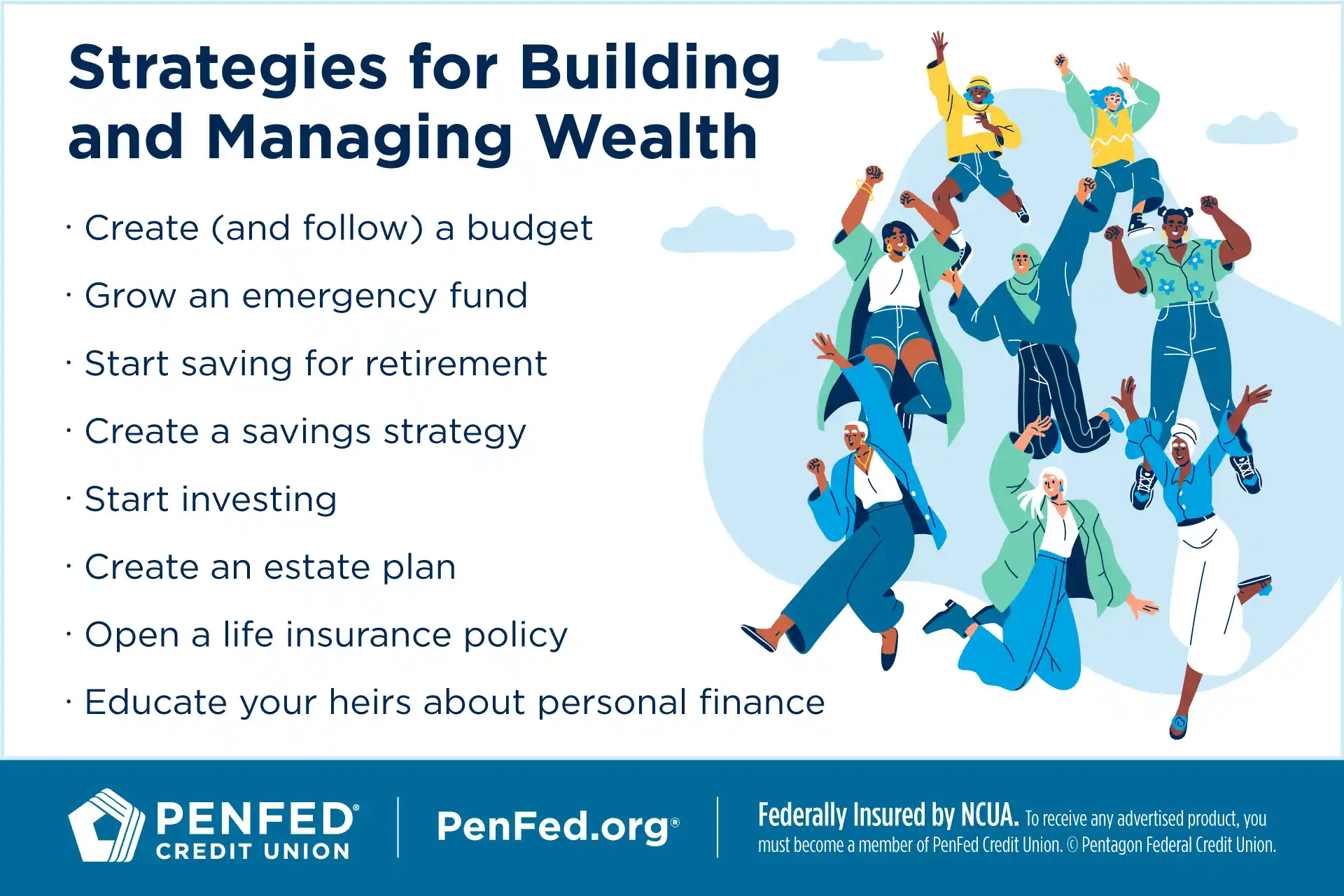Personal Finance
A Woman's Guide to Building Generational Wealth
What you'll learn:Strategies for building wealth as a woman
EXPECTED READ TIME: 10 MINUTES
Most of us know how to use money day to day, but long-term planning can be another thing entirely, especially if you’re starting with a hurdle. Even in 2024, men are still twice as likely to own investments than women (Mintel, 2024). Young women are also statistically less likely to be included in money talk from an early age.
Additionally, reports show that the more money your parents make ($200,000+), the more likely you are to hear about money and investments growing up — a crucial factor that determines whether you will be a successful wealth builder in your own right. So if you’ve ever wanted to put your money to work but felt overwhelmed getting started, you’re not alone — and we’ve got your back.
In this guide, we’ll cover the challenges women face building wealth and ways to overcome those challenges so you can prosper.
What Does it Mean to Have Generational Wealth?
The term “generational wealth” refers to the money and assets a family has accumulated over multiple generations. While generational wealth includes cash, it also includes life insurance policies, property, heirlooms, and businesses that are handed down from one generation to another.
Not everyone is born into a family with generational wealth, but those who are start out with some advantages in life. They’re more likely to receive financial support from their family, more likely to attend and finish college, and less likely to struggle with debt.
Anyone can build generational wealth with a little financial education and determination. It does take time — especially since growth in asset value and the accumulation of compound interest (or dividends) over time plays a central role in wealth building. But the wealth you build today can greatly benefit your family — or causes you’re passionate about — tomorrow.
Not everyone is born into a family with generational wealth, but those who are start out with some advantages in life.
How Much Money Is Needed for Generational Wealth?
Any amount of wealth or assets that are handed down from one generation to another is generational wealth. Even if you’re not passing on a vast fortune, you’re passing on generational wealth if you leave your descendants life insurance, a house, a checking account, and so on.
Challenges to Building Generational Wealth as a Woman
If you found your way here, you probably already know the financial challenges an average woman faces are not for lack of natural abilities. Instead, we see many external factors at work, from the roles women often play within their families and society to lingering norms that leave women out of the conversation from the earliest ages. Those challenges are likely to be amplified for women of color and first-generation American women.
While generational wealth includes cash, it also includes life insurance policies, property, heirlooms, and businesses that are handed down from one generation to another.
Being aware of these trials — and strategies to overcome them — can help you take control of your finances. First let’s understand some of these hurdles better. Then we’ll go into how you can overcome them.
The Caregiver Penalty
Women are more likely to take on caregiver duties for children and aging parents — even when they continue to work full time. These additional duties may mean delaying or missing out on promotions, shifting to part-time work, or leaving the workforce altogether.
These career disruptions mean that women have less time in the workforce to save for retirement. They may not reach their maximum earning potential over the course of their career, or they may hit it later and earn that higher income for less time. The result is that, globally, women 65 and older receive an average of 26% less retirement income than men in that age bracket.
Lower-Paid Careers
The gender wage gap refers to the difference in earnings between men and women. On average, women earn 83.7% of what men earn, with that gap widening for women of color.
While many factors influence this disparity, one major cause is that women are more likely to work in lower-paying jobs without benefits. But women often earn less than their male peers in the same industry, too, because of the “broken rung” — their struggle to take the first step into management positions that offer better compensation packages.
Single Parenthood
Women are still more likely to be single parents with primary custody than men. Single parents of any gender face an additional challenge in saving for retirement since often they bear the bulk of the financial burden of raising their children. With childcare, healthcare, school, and home costs, they may struggle to save without a solid single parent budget in place.
Longer Lifespans
A long life is a blessing, but it can also be hard to save for. On average, women in the U.S. live 5 years longer than men. That means women must stretch their retirement half a decade further than their husbands. This might not be the worst news you’ve heard, but it’s definitely a factor you need to consider when building wealth.
A long life is a blessing, but it can also be hard to save for. On average, women in the U.S. live 5 years longer than men.
Lack of Financial Literacy and Confidence
In 2021, the Global Financial Literacy Excellence Center conducted a survey measuring financial literacy. They found that women were more likely than men to select “do not know” from multiple answer choices. (However, when forced to choose an answer, they often answered correctly.)
The researchers determined that around one third of the financial literacy gender gap can be explained by “women’s lower confidence levels.” How does that confidence gap relate to wealth? Well, many paths to wealth involve some level of risk and familiarity with money. Less confidence means less risk taking. Women who don’t feel sure of themselves for lack of familiarity with investment would be less likely to branch out to savings tools and investments that might carry risk.
How do we increase confidence and close the gap? Education! We’re talking about financial literacy. The basics of financial literacy include budgeting, paying bills, and saving, while more advanced literacy includes knowledge around managing debt, utilizing credit, and investing. In the next section, we’ll look at why this is especially important for women today.
Why Is It Necessary for Women to Be Financially Literate?
According to a study from MarketWatch Guides, “only 57% of adults in the U.S. are financially literate,” and over 40% of Americans are unfamiliar with common saving tools such as high-yield savings accounts, IRAs, and money market accounts. As we noted earlier in this article, women are statistically less likely than men to receive financial education — meaning they are less likely to be given a chance at financial literacy.
Being financially literate helps you make better choices about how to spend and grow your money. People who lack financial literacy are more likely to get into unhealthy debt and less likely to save enough for retirement. In contrast, even a basic level of financial literacy can help you avoid bad debt, manage good debt, and save for the future.
Evidence from investment firms suggests that women may make better hedge fund managers.
Although stereotypes can depict women as being bad with money, evidence from investment firms suggests that women may make better hedge fund managers. They also found that female-founded companies generate an average of 10% more revenue over a five-year period than male-founded companies.
What does this tell us? When women are taught how to manage money, they manage it very well. Thankfully, financial literacy is a skill all of us can improve, even if we start out with very little knowledge.
It’s predicted that women — first Baby Boomer wives, then daughters and granddaughters — will inherit the lion’s share.
The Great Wealth Transfer
As the Baby Boomer generation ages, an estimated $30 trillion in wealth is poised to pass to their beneficiaries. It’s predicted that women — first Boomer wives, then daughters and granddaughters — will inherit the lioness’ share of that wealth. While inheriting money is nice, these women may see that money slip away without proper management.
Now is a good time for women to build their money management muscles. What you do with the wealth you inherit will have far reaching consequences for your descendants, particularly if you’re a Millennial or Zoomer who has struggled more with money than previous generations.

Practical Strategies for Building — and Managing — Wealth
Money requires active management, but that can feel overwhelming if you’re new to it. Here are some tips to get you started.
Start With Achievable Goals
The path to success comes from lots of tiny achievements. Each time you succeed in any little way, you build confidence and motivation, which means you’re more and more likely to succeed at subsequent ventures.
If sticking to a monthly budget is a goal, start by sticking to a weekly — or even daily — budget. If owning real estate is a goal, start by simply forging and maintaining a relationship with one real estate professional in your town. Whatever your goals are for your current phase of wealth-building, learn everything you can, study, and take notes about the markets you want to invest in. You may not have the funds to make sizeable investments at the start, but staying informed about these markets will make you feel more confident so that you’re ready to make smart decisions when you do.
The smaller the goal, the more likely you are to succeed. And if you don’t succeed, just try again. Don’t get down on yourself or worry about what you’re doing wrong — feel your feelings, assess the situation, seek feedback if necessary, and move on or try again. Setbacks will happen, but in most situations, it’s going to be your reaction that makes or breaks you, not the setback itself.
Setbacks will happen, but in most situations, it’s going to be your reaction that makes or breaks you, not the setback itself.
Find a Mentor
If you’ve been left out of the wealth-building discussion, or there simply wasn’t ever a discussion in your house growing up, you might not have much luck seeking guidance from your elders. That’s where mentorship can help.
If you’re still in school, ask a favorite teacher for advice and let them know you’re seeking mentorship — a sustained one-on-one relationship based on the transfer of knowledge. Math and economics teachers are the obvious go-to here, but you might be surprised what your English professor knows about real estate or trading!
If you’re out of school, you can reach out to local professionals and people in your network. Try to find someone who is willing to mentor you for free. While mentorship is a common way for entrepreneurs to capitalize on their experience, free advice is better for someone who is just getting started.
If you’re still in school, ask a favorite teacher for advice and let them know you’re seeking mentorship — a one-on-one relationship based on the transfer of knowledge.
Create a Monthly Budget
A monthly budget is the heart of money management. It’s a plan for what you want your money to do and a record of what actually happens to it. Reviewing your budget regularly is the best way to ensure you’re using your money in a way that aligns with your needs and values.
Start by listing all your expenses and sources of income. If you’re spending everything you earn, then start looking for places to trim expenses, or consider ways to generate additional income.
Once you’ve budgeted for your essentials, it’s time to consider long-term goals like saving for emergencies, retirement, and wants. Don’t assume you’ll save whatever is left over once your essentials are covered — treat saving like an expense and list it in your budget.
Grow an Emergency Fund
An emergency fund is money saved to cover unforeseeable, essential expenses like ER visits or unemployment. A healthy emergency fund should cover your essential expenses for 3-6 months. Having an emergency fund helps you avoid relying on credit cards or depleting your savings when something unexpected happens.
The best way to build an emergency fund is to open an interest-bearing account, like a high-yield savings or money market account, and automatically transfer money to it each pay period. Even if you can only manage $10 or $20 at first, with time (and dividends), your money will grow.
Tip
If you don’t need to pay off high-interest debt with them first, consider dropping any windfalls or unexpected bonuses into your emergency fund.
Consider dropping any windfalls or unexpected bonuses into your emergency fund.
Start Saving for Retirement
Retirement accounts are a great way to grow wealth since they often come with special tax advantages. It’s a good idea to start early — the earlier you start, the more your accounts will grow as they earn interest and/or dividends and the more their assets will increase in value. Look into these common retirement accounts:
401(k)
Employer-sponsored 401(k)s simplify retirement saving. When a portion of your monthly income is deposited to your account automatically, your employer will usually match up to a certain percentage of that monthly income. This match might be as small as 1-2%, but over time it will add up. For example, if your salary is $60,000, you contribute 4% of that to a 401(k), and your employer matches up to 2% of your salary, that would mean a total yearly contribution of 6% of $60,000, which is $3,600. And that doesn’t include growth of the retirement account due to the growth in the 401(k)’s funds and paid dividends. Additionally, as long as you keep the same or increase your contribution percentage, your yearly contribution will increase whenever you get a raise.
IRA and Roth IRA
If your employer doesn’t offer retirement benefits, you can choose from self-funded retirement options. A traditional IRA allows you to save pre-tax income and pay tax on it when you withdraw that money in retirement. Some people like this option because they can save more up front and (at least theoretically) earn more from a larger balance.
Another option is a Roth IRA, where you’ll save after-tax income and not have to pay taxes when you withdraw that money in retirement. Some people prefer this option, assuming they may have less money to cover the taxes in old age.
You can invest your HSA funds, and then draw on them like you would with a 401(k) or traditional IRA, once you turn 65.
Health Savings Account
If you have a Health Savings Account (HSA), that can boost your retirement savings, too. HSAs enable you to save pre-tax money to use for current or future medical expenses. You can invest your HSA funds, and then draw on them like you would with a 401(k) or traditional IRA, once you turn 65.
Create a Savings Strategy
Basic savings accounts earn less interest than other account types, but they’re still a great tool for managing money. They keep your money safe, cost little (or nothing) to open, and can improve your cash flow.
Try using separate savings accounts for short-term goals (like vacations) and long-term savings goals (such as a down payment on a car or house). Whatever you do, keep your emergency fund separate from other savings, so you don’t accidentally dip into your safety net and come up short when you really need it.
If you have basic savings figured out — or you’re just looking for a savings option with higher yields — consider one of these:
High-yield savings account (also known as a HYSA) for a high savings balance that can maximize the high annual percentage yield (APY)
Certificate for locking in a potentially higher interest rate with a guaranteed return
Money market account if you want competitive rates along with the convenience of a debit card
Start simply and take more risks as your knowledge grows.
Leverage Real Estate
Whether you’re saving for a first property or trying to decide what to do with one you inherited, purchasing real estate can be an excellent way to establish wealth. As long as you spend within your means and stick to conventional loans, real estate is usually a low-risk investment. Here are a few ways you can leverage real estate:
Buy When Rates Are Low
This one may seem out of range for 2024, but it’s still the right advice. If you have to buy when rates are high, create a plan to refinance your loan when they drop again. Keep an eye on the market, talk to friends in the industry.
Consider Real Estate Wholesaling
Wholesaling means finding properties that are otherwise under the radar, putting a contract on them with the “right to assign,” and then selling that contract at a higher price to a buyer with more money but less time to hunt down good deals. You can also work out deals with local investors where you simply find the property and collect a “finder’s fee” once there is a ratified contract.
For example, maybe you know your neighbor wants to sell their house and you also know a local realtor who buys and sells. There are some ethical considerations here — ideally your neighbor gets a fair price and your investor friend is happy to pay you a fee for the convenience you offered them.
You can also work out deals with local investors where you simply find the property and collect a “finder’s fee” once there is a ratified contract.
Real estate wholesaling can be used to unfairly drive gentrification and take advantage of the elderly, but you can certainly get into this line of work honestly by making sure everything is fair. If the idea of sifting through tax records to find out what properties are in default or hitting the pavement and writing letters to abandoned houses owned by out-of-state individuals sounds fun, this could be a way to get ahead.
Use the money to save for your own investment property or funnel it into another type of investment. And don’t forget to pay your taxes!
Become a Landlord
If you inherit a house but don’t want to live there, consider renting it out before selling. If you already own a home with lots of equity, consider taking out a HELOC and using the funds to put a down payment on a rental property. If you own your home and experience a loss or downshift in income, consider moving somewhere you can afford and renting out your property to someone with a higher income.
If you live nearby, you can manage the investment property yourself — or you can pay a management company a small fee. Rentals do cost money to maintain, but in the long run, rental income will bring you a lifetime of passive income. And since your mortgage will stay the same while housing costs overall rise, your profits will increase every year without any effort on your part.
If you own your home and experience a loss or downshift in income, consider moving somewhere you can afford and renting out your property to someone with a higher income.
If you have kids, you can purchase an investment property in the town they choose for college and set them up there. When they’re done with college, you can sell or continue renting the property. College towns generally have more stable than average rental returns, as well.
Renting property can be a controversial way to build wealth, since housing laws tend to favor landlords and have been used against people experiencing hardship. That said, you can definitely own and rent out your property while making money with ethics top of mind.
Investing in exchange-traded funds (ETFs) and dividend index funds is an easy way to get in on the stock market.
Start Investing Now
Investments can be the most intimidating part of personal finance, but it’s possible to build wealth while keeping things simple — or to start simply and take more risks as your knowledge grows. You can also choose from a range of assets, depending on:
How much you have to invest
How much time you want to spend researching investments
How much risk you’re comfortable with
How liquid or illiquid you need your assets to be
Investing in exchange traded funds (ETFs) and dividend index funds is easy ways to get in on the stock market. These funds allow you to invest in collections of stocks instead of individual stocks, and these groups usually offer better performance over time than individual stocks. They’re easy and inexpensive to get into and carry little risk, and you can manage them yourself through a brokerage account.
All investments take time to mature, so the earlier you start investing, the better. Start now, even if you can only contribute small amounts in the beginning. Then increase your contributions as you’re able. If you need help getting started or want to develop a more aggressive investment strategy, you can reach out to a financial advisor.
Making Plans for Your Wealth for After You’re Gone
You can’t take it with you, but you can decide where it goes. Not only will this simplify matters for your loved ones when you pass, but it can minimize conflict and ensure your hard-earned money goes to good use.
Create an Estate Plan
Estate planning is the legal process of deciding what happens to your estate once you’re gone. While the word “estate” might have you thinking of giant houses and sprawling gardens, it actually refers to all of your money, assets, and property, whatever that looks like for you. This could be cash, funds in savings and checking accounts, stocks, bonds, real estate, vehicles, jewelry, heirlooms, tools, furniture, and/or valued collections.
A good estate plan simplifies the process of transferring your property to your heirs, and it can even reduce their tax burden. You can work with an estate planner or lawyer to create a plan that works for your situation.
Open a Life Insurance Policy
Life insurance covers any costs you leave behind and provides a way to leave a (generally) non-taxable inheritance to your loved ones. Like with other types of insurance, you’ll open a policy based on your needs, and then pay monthly premiums. When you die, your insurance company will pay your beneficiaries an agreed-upon amount.
There are two main types of life insurance:
Term life, which is more affordable but only covers you for a certain period of time
Permanent/whole life, which is more expensive but covers you for your full life
Life insurance costs can vary depending on factors like your age, lifestyle factors, and amount of coverage. You may be able to save money by taking advantage of employer group rates.
Help your family succeed by talking openly about money.
Educate Your Heirs
The best way to leave your estate in good hands is to pass on your financial knowledge to your kids and grandkids. 70% of wealth transfers fail, and two reasons why are lack of communication and lack of financial literacy. Help your family succeed by talking openly about money.
Start when your heirs are young, and they’ll get in years of practice before they’ll need to make big decisions around college, loans, and their own careers. You can even open a savings account for them and help them start their own savings habit right from the start.
Read everything, take notes, lean on your friends, and learn from your peers — you have the power to take charge of your money and put it to work.
Building Generational Wealth for Child-Free Women
An increasing number of American women are living child-free, but that doesn’t mean they shouldn’t be concerned with growing their wealth or managing their estates. For one thing, building wealth will help you live your best life in old age, whether you’re traveling the globe, tearing through mysteries with the local book club, or making the move to a bustling retirement community.
And once you’re gone, assets don’t have to go to direct descendants (especially if you don’t have any). Instead they can be left to nieces and nephews, godchildren, or even friends’ children. Another option is to leave your assets to institutions and charities that support causes you care about. Gifting your assets could make all the difference in someone else’s life, whether or not you have enough to get your name on a building.
Gifting your assets could make all the difference in someone else’s life, whether or not you have enough to get your name on a building.
The Takeaway
No one is born knowing the ins and outs of personal finance, but the good news is that there are more learning resources available today than ever before. Read everything, take notes, lean on your friends, and learn from your peers — you have the power to take charge of your money and put it to work.
Wealth Management Strategies for Each Stage of Your Life
Discover the diverse offering of products, services, and support available to our members.




